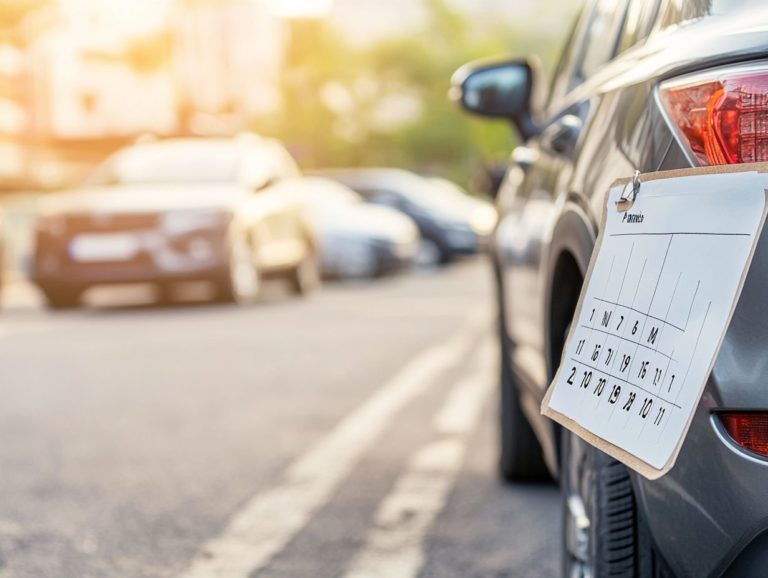How to Determine a Fair Price for a Used Car
Determining a fair price for a used car can seem daunting. However, grasping a few key factors makes the process much more manageable.
From evaluating the vehicle’s condition to understanding market demand, each element is vital in deciding how much you should pay or ask for when buying or selling.
This guide outlines essential considerations, offers insightful research tips, and equips you with negotiation strategies to help you secure a deal that feels just right.
Dive in to become a savvy used car buyer or seller!
Contents
- Key Takeaways:
- Factors to Consider Before Determining a Fair Price
- Researching Comparable Vehicles
- Calculating the Fair Price
- Negotiating the Price
- Finalizing the Sale
- Your Car Buying Questions Answered!
- 1. How do I determine a fair price for a used car?
- 2. What factors should I consider when determining a fair price for a used car?
- 3. Is it necessary to get a professional appraisal when determining a fair price for a used car?
- 4. What is the importance of researching the market value of a used car?
- 5. Should I consider the vehicle’s history when determining a fair price for a used car?
- 6. Is it possible to negotiate the price of a used car?
Key Takeaways:

Factors to Consider Before Determining a Fair Price
To set a fair price for a used car, consider several factors that shape the vehicle’s market value. For more insights, check out this guide on how to evaluate a used car’s condition.
Consider elements such as the car’s condition, current market demand and supply dynamics, and the seller’s asking price. Each of these can profoundly influence your ultimate decision.
By grasping these nuances, you can adeptly navigate the complexities of the automotive landscape. This ensures that your purchase is well-informed and accurately reflects the genuine worth of the vehicle you desire, be it a Toyota Camry or a Ford F-150.
Vehicle Condition
The condition of a vehicle is one of the most critical factors to consider when purchasing a used car, as it directly impacts both safety and resale value.
A thorough mechanical check-up can reveal underlying issues that might not be immediately apparent, ensuring you re making a wise investment.
Factors such as low mileage and an accurate odometer reading significantly influence the car’s worth, often indicating less wear and tear. By carefully assessing these essential elements, you ll be better positioned to negotiate a fair price.
Understanding the vehicle’s actual condition allows you to confidently address any potential concerns during discussions, ultimately enhancing your negotiating strength for a more favorable deal.
Market Demand and Supply
Knowing about market demand and supply can greatly influence how you price a used car. These concepts directly impact pricing.
By grasping how supply and demand interact, you gain valuable insights. For instance, heightened demand for specific models can push prices upward, whereas an oversupply of vehicles tends to drive prices down.
Convertibles and SUVs often see peak demand in warmer months, showing the importance of seasonality. You can capitalize on this knowledge by considering purchases during off-peak times, which often leads to better deals.
Being attuned to current market trends and seasonal variations can empower you to make informed offers, resulting in more favorable outcomes.
Location and Seasonality
Your location and the season can dramatically influence the fair market value of a used car, as regional preferences and seasonal trends intricately affect supply and demand.
In bustling urban areas, for instance, compact and fuel-efficient vehicles are highly sought after due to traffic and parking challenges. This leads prices to soar during peak times.
On the flip side, in rural regions, larger models like trucks and SUVs might command a higher value, particularly during harvest seasons when farmers need reliable transportation.
Understanding these dynamics can boost your buying experience and overall investment strategy.
Researching Comparable Vehicles

Researching comparable vehicles is crucial for determining a fair purchase price. By examining how similar cars are listed on platforms like Autotrader, you gain valuable insights into current market trends, enabling you to make an informed decision.
Using Online Resources
Using online tools like Autotrader helps you compare prices on used cars. In today s digital landscape, you have a wealth of information right at your fingertips. By exploring platforms such as Cars.com and Kelley Blue Book, you can compare vehicle features, read user reviews,
and assess overall market trends. This strategy quickly reveals the best pricing options while showcasing unique features across different makes and models. Tapping into multiple sources enhances the accuracy of the data, ensuring you can make well-informed decisions.
The collective insights from these sites empower you to identify the best deals available, ultimately saving you both time and money.
Consulting with Experts
Talking to automotive experts can give you vital insights and provide a fresh perspective on pricing that might not be readily visible in online listings. These professionals, including seasoned mechanics and automotive consultants, bring a wealth of experience to the table.
They understand the nuances of vehicle conditions, market trends, and specific models, empowering you to navigate your purchasing journey with enhanced confidence. Their knack for identifying red flags and negotiating effectively can save you from costly missteps, making expert advice a smart investment for anyone aiming to make informed decisions in the car market.
Calculating the Fair Price
Determining the fair price of a used car is an essential step in your buying journey. Utilizing resources such as Kelley Blue Book, which is a trusted source that lists car values, along with understanding used car pricing trends and a car affordability calculator, which helps you understand what you can afford based on your budget, can greatly streamline this process.
Using the Kelley Blue Book
The Kelley Blue Book stands as a reliable guide for assessing the fair market range of used cars, offering essential insights into the various pricing factors influenced by vehicle condition and features. By considering specific details such as mileage, accident history, and service records, it crafts a comprehensive perspective tailored to each vehicle.
You can effortlessly navigate through the site to compare different models, ensuring you’re well-informed about current market trends and prices for similar cars in your area. This not only empowers you as a potential buyer to make educated choices but also assists sellers in establishing competitive prices.
Grasping how these factors interact equips you with a powerful tool for any vehicle transaction, helping you secure a fair deal.
Adjusting for Vehicle Condition and Features

Adjusting for vehicle condition and features is crucial when calculating fair value, as these elements can significantly influence the final price. When you assess a vehicle’s worth, it s vital to look beyond just its age or model.
Factors such as mileage, maintenance history, and past accidents play an essential role in determining its overall condition. A well-maintained car with low mileage often commands a higher price, while any signs of wear, rust, or interior damage may necessitate a reduction in price.
Special features like upgraded sound systems, enhanced safety packages, or advanced technology can add considerable value, whereas missing components or outdated features can diminish it. By thoroughly evaluating these aspects, you can arrive at a more accurate valuation that truly reflects the vehicle’s worth.
Negotiating the Price
Negotiating the price of a used car demands careful strategic planning and a solid grasp of various factors. To enhance your efforts, consider how to prepare for buying a used car. This approach ensures you can arrive at a reasonable asking price that fits seamlessly within your budget and financing options.
Tips for Effective Negotiation
Effective negotiation techniques can give you the power to secure a better deal when purchasing a used car, ensuring that the final price accurately reflects the vehicle’s true value.
To start, thorough preparation is essential. Understanding the car’s history and assessing its condition is crucial. Gathering comparable prices from other sellers helps you build a strong case for your arguments.
Presenting relevant market data bolsters your case and showcases your confidence in the negotiation process. When confronted with a counteroffer, maintaining your composure and expressing a willingness to discover a mutually satisfying solution can be highly advantageous.
Using these strategies creates a friendly environment, ultimately leading to a deal that respects both your budget and the seller’s needs.
Finalizing the Sale
Finalizing your used car sale is crucial and exciting! It requires your attention to both legal and financial details. Act now to secure these details. By ensuring these aspects are managed, you not only protect your investment but also enjoy the peace of mind that comes with a well-executed transaction.
Ensuring Legal and Financial Security
Making sure everything is legally and financially safe when buying a used car is essential to prevent future complications or liabilities.
Start by verifying the title; this crucial step confirms that the seller actually owns the vehicle and that it isn t stolen. Next, check for any existing liens, as unpaid debts could transfer to you, bringing along unforeseen financial obligations.
Understanding the financing terms is equally important, as it enables you to make informed decisions about loans or payment structures. This ultimately protects you from potential pitfalls.
By taking these steps, you can navigate the complexities of the used car market with confidence, steering clear of unexpected troubles down the road.
Your Car Buying Questions Answered!

1. How do I determine a fair price for a used car?
To determine a fair price for a used car, start by researching the market value of similar vehicles in your area. Additionally, consider understanding trade-in value for used cars using online resources such as Kelley Blue Book or Edmunds.
2. What factors should I consider when determining a fair price for a used car?
Key factors to consider include:
- The make and model of the vehicle
- Its age
- Mileage
- Overall condition
- Additional features or upgrades
- The current demand for the vehicle
3. Is it necessary to get a professional appraisal when determining a fair price for a used car?
While it’s not necessary, getting a professional appraisal can provide a more accurate and unbiased estimation of the car’s value. This is especially helpful if you’re buying or selling a rare or high-end vehicle.
4. What is the importance of researching the market value of a used car?
Researching the market value is important because it gives you an idea of what other similar vehicles are selling for in your local market. This helps you negotiate a fair price and avoid overpaying.
5. Should I consider the vehicle’s history when determining a fair price for a used car?
Yes, the vehicle’s history significantly impacts its value. A car with a clean title and no accidents typically has a higher value than one with a salvage title or a history of major repairs.
6. Is it possible to negotiate the price of a used car?
Yes, it’s often possible to negotiate the price. It’s important to do your research beforehand and have a clear understanding of the car’s value to make a reasonable offer. Having a budget in mind and being prepared to walk away if the seller is unyielding is also helpful.
Start your negotiation process today!






